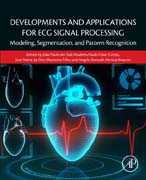
Developments and Applications for ECG Signal Processing: Modeling, Segmentation, and Pattern Recognition
do Vale Madeiro, Joao Paulo
Cortez, Paulo Cesar
Computational algorithms based on digital signal processing techniques are essential for the automatic analysis of ECG signals in the most diverse scenarios. Parameters extracted through signal segmentation and analysis serve as a basis for statistical or artificial intelligence based classifiers to recognize patterns of heart diseases or other adverse events. Developments and Applications for ECG Signal Processing presents the importance of accurate and reliable techniques for ECG signal processing which have the potential to significantly increase the applicability of ECG use for diagnosis. This title exposes and details a wide range of challenges in the processes of acquisition, preprocessing, segmentation, mathematical modelling and pattern recognition in ECG signals, while presenting in each case, practical and robust solutions based on digital signal processing techniques. The title contributes to research on automatic analysis of ECG signals, extends the resources for rapid and accurate diagnoses, particularly for long-term signals where visual analysis by specialist physicians is untenable. The title consists in chapters covering classical and modern features for interpretation of ECG signals, ECG signal acquisition systems, techniques for noise suppression for ECG signal processing, delineation of QRS complex, mathematical modelling of T- and P-waves, and the automatic classification of heartbeats. Gives comprehensive coverage of ECG signal processingPresents development and parametrization techniques for ECG signal acquisition systems, so as to maintain the signal-to-noise ratio at tolerable levelsAnalyses and compares distortions caused by different digital filtering techniques for noise suppression applied over the ECG signalDescribes how to identify if a digitized ECG signal presents irreversible distortion through analysis of its frequency components prior to and after filteringConsiders how to enhance QRS complexes and differentiate these from artefacts, noise, and other characteristic waves under different scenariosAsks what mathematical tools can be used to identify the beginning and end of the QRS complex INDICE: 1. Classical and Modern Features for Interpretation of ECG signal2. ECG signal acquisition systems3. Techniques for noise suppression for ECG signal processing4. The issue of QRS detection5. Delineation of QRS complex: challenges for the development of widely applicable algorithms6. Mathematical modelling of T-wave and P-wave: a robust alternative for detecting and delineating those waveforms.7. The issue of automatic classification of heartbeats
- ISBN: 978-0-12-814035-2
- Editorial: Academic Press
- Encuadernacion: Rústica
- Páginas: 212
- Fecha Publicación: 01/12/2018
- Nº Volúmenes: 1
- Idioma: Inglés
